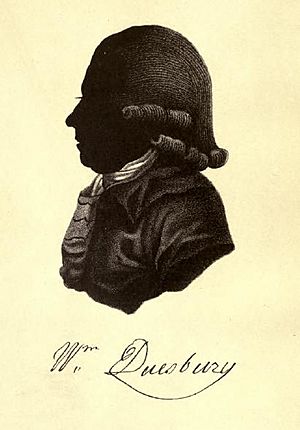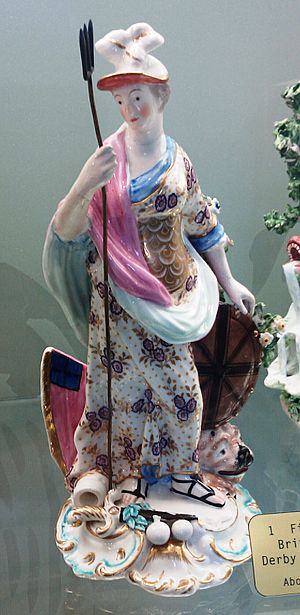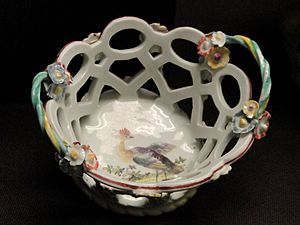William Duesbury facts for kids
Quick facts for kids
William Duesbury
|
|
|---|---|

Silhouette of William Duesbury (18th century).
|
|
| Born |
William Duesbury
7 September 1725 Longton Hall, Staffordshire, England
|
| Died | 30 October 1786 (aged 61) |
| Occupation | Fine porcelain manufacture |
| Spouse(s) | Sarah James |
| Children | William Duesbury (1763–1796) |
William Duesbury (1725–1786) was a very important person in English history. He was an "enameller," which means he painted beautiful designs on porcelain. He became a successful businessman who started the famous Royal Crown Derby porcelain company. He also owned other porcelain factories in places like Bow, Chelsea, Derby, and Longton Hall.
Contents
William Duesbury's Life Story
William Duesbury was born on September 7, 1725. His father, also named William Duesbury, was a currier (someone who prepares leather) from Cannock, Staffordshire.
Early Work as an Enameller
Around 1742, when he was about 17, William Duesbury started working in London. He was an "enameller," meaning he painted designs on china. He worked there until 1753. During this time, he decorated porcelain from the Chelsea factory and possibly other types of pottery.
Later, between 1754 and 1755, he lived and worked in Longton Hall. This was where his father lived, and there was a small china factory there.
Starting the Derby Porcelain Factory
On January 1, 1756, Duesbury moved to Derby with his father. He bought a share in a pottery workshop on Cockpit Hill. His new business partners were John Heath and Andrew Planche. Planche was a talented potter from France.
Planche did not stay in the partnership for long. Duesbury, with financial help from Heath, opened a new factory. This new factory was located on Nottingham Road in Derby. Their new business quickly became very successful. They even hired an agent in London in April 1757 to help sell their products.

Expanding the Business
In 1770, Duesbury was able to buy the Chelsea porcelain factory. This factory was not doing well at the time. For the next few years, he likely used the Chelsea factory to decorate porcelain. This porcelain was made in Derby and then sent to London to be sold.
Duesbury continued a tradition at Chelsea of holding yearly auctions. The first auction was held on April 17, 1771. More auctions followed in the years after that.
In June 1774, he opened a warehouse in London. It was located at No. 1 Bedford Street, Covent Garden. He started holding regular auctions of his porcelain there. This meant he no longer needed to hold the Chelsea auctions. Sometimes, the products were called "Derby and Chelsea" ware. Other times, they were just called "Chelsea" ware. People could always see examples of the different products at the warehouse in Bedford Street.
Royal Recognition
In March 1775, William Duesbury and John Heath received a special honor. George III, the King of England, gave them a Royal Warrant. This meant they were officially named "China Manufacturers in Ordinary to His Majesty." This important title allowed them to put a crown on their porcelain mark. The Duesbury "D" mark now had a crown above it. This showed everyone they were "Derby China Manufacturers to His Majesty."
Also in 1775, Duesbury bought the Bow porcelain factory. In 1777, he bought Giles's manufactory in Kentish Town and other smaller factories.
Facing Challenges and Success
In 1779, Duesbury faced a big problem. His business partner, John Heath, went bankrupt. This caused a serious financial crisis for Duesbury's company. However, Duesbury was a strong businessman. He managed to get through the crisis.
In August 1780, he was able to buy Heath's share of the business. He bought it from Heath's creditors (the people Heath owed money to). This made Duesbury the only owner of the company. His company was now "the leading porcelain manufacturer in England."
In 1783, his business got another boost. George, Prince of Wales, chose Duesbury's porcelain. He used it to furnish his home, Carlton House. The next year, in 1784, Duesbury brought all his manufacturing processes together. Everything was now done in Derby.
Later Life and Legacy
William Duesbury died on October 30, 1786. He passed away from a heart attack at his china factory in Nottingham Road, Derby. He was buried on November 2 at St Alkmund's Church, Derby. His successful business was then taken over by his oldest son and partner, William Duesbury (1763–1796).
Remembering William Duesbury
In early 2013, the Derby City Council and Derby Civic Society made an announcement. They said they would put up a Blue Plaque to remember William Duesbury. This special plaque is a memorial to him at Landau Forte college in Derby.
 | Bessie Coleman |
 | Spann Watson |
 | Jill E. Brown |
 | Sherman W. White |


